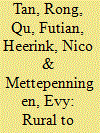| Srl | Item |
| 1 |
ID:
175135


|
|
|
|
|
| Summary/Abstract |
Ethnic and religious minorities have played a significant role in the long history of Kurdistan. At an official level, their political position was significantly strengthened with the advent of autonomy for the Kurdistan Region in northern Iraq in 1992. Most importantly, a quota system was established that reserved seats for several minority groups in the Kurdistan Parliament, often cited as an example of tolerance for diversity and respect for minority rights. Nevertheless, there is a lack of empirical research examining how ethnic and religious quotas affect democratic stability, quality of representation, and opportunities to represent authentic interests within the Kurdistan Regional Government (KRG). The politicians who occupy the reserved seats have come under criticism for merely supporting the policy programs of the dominant Kurdish parties, which deprives ethnic and religious minority groups of authentic representation and exposes the minority parties to allegations that they are politically exploited. This article analyzes the dynamics of minority political participation in Iraqi Kurdistan, how representation has been affected by the dominance of the ruling parties, and factors that guide the behavior of minority politicians while serving in quota-allocated positions. It also examines the effects of reserving seats through the quota system on the political behavior of minority groups. To these ends, this article focuses on parliamentary quotas and their impact on democratic stability, decision-making, and the empowerment of minority groups in the Kurdistan Region.
|
|
|
|
|
|
|
|
|
|
|
|
|
|
|
|
| 2 |
ID:
110496


|
|
|
|
|
| Publication |
2011.
|
| Summary/Abstract |
The current system of converting farmland to urban land use in China can be characterized as a hybrid system that combines government controls with market-based transfers. In this paper we argue that this hybrid governance structure causes an over-conversion of farmland from the rural to the urban sector, as compared to a competitive market situation, and a welfare reallocation that discriminates against farmland owners. We develop a partial equilibrium model that can be used to examine the impact of the current hybrid governance structure on the over-conversion of farmland and to analyze the welfare changes for different groups of actors and the resulting net social welfare loss. Using a dataset with detailed information on farmland acquisitions and urban land transactions in Yingtan City in Jiangxi Province, we illustrate how this framework can be applied. Our results indicate an over-conversion of 33.5% of the total converted farmland in this city between 1999 and 2003. The welfare of farmland owners affected by the conversion decreased by 1.38 billion RMB, while the net social welfare loss equaled more than 270 million RMB during the same period. The local government obtained 380 million RMB of revenues by re-selling farmland as urban land through competitive conveyance mechanisms between 2002 and 2005, while the manufacturing sector gained an estimated 280 million RMB from buying land use rights at relatively low prices. We conclude that the current policy of increasing urban land conveyance through competitive mechanisms does not address two major underlying causes of over-conversion, and that protection of farmland would be better served by replacing the current hybrid rural to urban land market structure by a competitive land market.
|
|
|
|
|
|
|
|
|
|
|
|
|
|
|
|